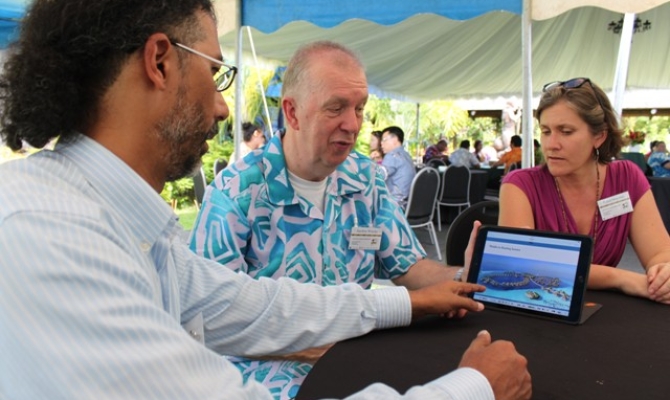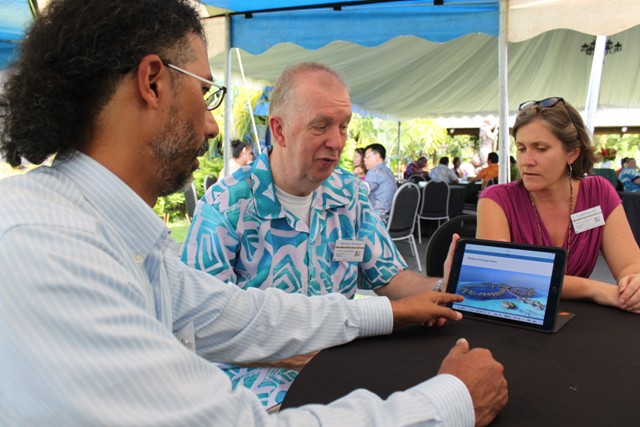
Climate Change Resilience
14 May, 2015, Apia, Samoa, PCCR - The Netherlands representatives are at the Pacific Climate Change Roundtable meeting this week in Apia, Samoa to share lessons on rising sea levels and disaster preparedness.
Mr. KoosWieriks, strategic advisor from the Ministry of Infrastructure and the Environment in The Netherlands explained that the Kingdom of the Netherlands consists of four countries, three of which are low-lying islands in the Caribbean – Aruba, Curacao, and St Maarten – and The Netherlands, where two-thirds of the country is below sea level.

He added that The Netherlands government felt it was important for him to come to Samoa for the Pacific Climate Change Roundtable prior to the COP21 negotiations in Paris in December to hear what the Pacific concerns were and how they could help.
In a session called "Water Co-operation for a Secure World", he said The Netherlands had a long history in water management, coastal protection and land reclamation. "Seventy per cent of our national product is produced below sea level so when something goes wrong, it really goes wrong."
In 1953, The Netherlands southern region has hit by a huge storm that killed 2000 people and caused major flooding.
"We said never again," Wieriks. "We built huge dams and barriers and we felt safe.
"In the years after, our population and economy grew and we were not aware that our risk increased by the day. In 2005 our eyes were opened again when we saw what happened in Louisiana with Hurricane Katrina. We asked if we are prepared for that? The answer was no and we started changing your policies – Be Prepared is the message we are spreading around.
"The most important learning is please look forward. Sea level will rise – so already we have created a big fund that we can use. We are investing in resilience while the rest of the world is investing in repairs."
During the session, Secretariat of the Pacific Regional Environment Programme Climate Change director NetatuaPelesikoti asked how Pacific regional agencies or national governments might engage or partner with The Netherlands.
Wieriks said there are a number of approaches such as using Dutch expertise in funded projects, capacity building and information sharing.
He said he realised The Netherlands was in a luxury situation financially compared the Pacific Island countries but the main learning was awareness and preparedness.
"When people are aware of the risk, they can reduce damage with elevated buildings, houses on stilts, and floating houses for example. People are inventive – they can plant mangroves, farm in smarter ways. We have found it is cheaper and more environmentally friendly to work with nature.
"The first thing is awareness and communication. There also needs to be a sense of urgency, to understand the problem, take an adaptive approach and preventative measures."
Wieriks said in the Caribbean island of Aruba, they were looking to use 100 per cent renewable energy 2020.
"We also have small units, half the size of a shipping container that can be used with solar panels, a small windmill and a sea water to fresh water converter."
He said that there also efforts are aimed at finding innovative financing mechanisms and promoting public-private partnerships.
Aruba is part of the Carbon War Room project that was founded by entrepreneur Sir Richard Branson.
Other important experiences with small island states include coastal protection, land reclamation, "floating" solutions and smart solutions for low-energy drinking water preparation. Examples of these experiences were shown for Dutch initiatives in the Maldives.
The Netherlands has already contributed $100mln to the Green Climate Fund, and uses .7% of national GDP to overseas aid. It has also contributed $50mln to the World Bank Global Water Practice.
The Pacific Climate Change Roundtable is held from 12 – 14 May in Apia, Samoa. The event in its current format has been coordinated by SPREP with guidance from a steering committee.
The PCCR has been made possible with support from the Government of Switzerland, Government of Samoa, Government of Australia, European Union, GIZ, United Nations Development Program (UNDP), Secretariat of the Pacific Community (SPC), Pacific Islands Forum Secretariat (PIFS), University of the South Pacific (USP) and the Pacific Council of Churches (PCC). Additional funding support was provided by the EU-GIZ Adapting to Climate Change and Sustainable Energy (ACSE) Programme, and Climate Analytics through its High Level Support Mechanism (HLSM) project as well as the United States Agency for International Development (USAID).– Faumuina Tafuana'i #pccr2015
ENDS
Mr. KoosWieriks, strategic advisor from the Ministry of Infrastructure and the Environment in The Netherlands explained that the Kingdom of the Netherlands consists of four countries, three of which are low-lying islands in the Caribbean – Aruba, Curacao, and St Maarten – and The Netherlands, where two-thirds of the country is below sea level.

KoosWieriks, strategic advisor from the Ministry of Infrastructure and the Environment in The Netherlands, (pictured centre) shows a floating island concept to Pacific Organic and Ethical Trade Community co-ordinating officer Karen Mapusua (left) and RiyadMucadam from the Republic of the Marshall Islands at the Pacific Climate Change Roundtable in Apia, Samoa.
He added that The Netherlands government felt it was important for him to come to Samoa for the Pacific Climate Change Roundtable prior to the COP21 negotiations in Paris in December to hear what the Pacific concerns were and how they could help.
In a session called "Water Co-operation for a Secure World", he said The Netherlands had a long history in water management, coastal protection and land reclamation. "Seventy per cent of our national product is produced below sea level so when something goes wrong, it really goes wrong."
In 1953, The Netherlands southern region has hit by a huge storm that killed 2000 people and caused major flooding.
"We said never again," Wieriks. "We built huge dams and barriers and we felt safe.
"In the years after, our population and economy grew and we were not aware that our risk increased by the day. In 2005 our eyes were opened again when we saw what happened in Louisiana with Hurricane Katrina. We asked if we are prepared for that? The answer was no and we started changing your policies – Be Prepared is the message we are spreading around.
"The most important learning is please look forward. Sea level will rise – so already we have created a big fund that we can use. We are investing in resilience while the rest of the world is investing in repairs."
During the session, Secretariat of the Pacific Regional Environment Programme Climate Change director NetatuaPelesikoti asked how Pacific regional agencies or national governments might engage or partner with The Netherlands.
Wieriks said there are a number of approaches such as using Dutch expertise in funded projects, capacity building and information sharing.
He said he realised The Netherlands was in a luxury situation financially compared the Pacific Island countries but the main learning was awareness and preparedness.
"When people are aware of the risk, they can reduce damage with elevated buildings, houses on stilts, and floating houses for example. People are inventive – they can plant mangroves, farm in smarter ways. We have found it is cheaper and more environmentally friendly to work with nature.
"The first thing is awareness and communication. There also needs to be a sense of urgency, to understand the problem, take an adaptive approach and preventative measures."
Wieriks said in the Caribbean island of Aruba, they were looking to use 100 per cent renewable energy 2020.
"We also have small units, half the size of a shipping container that can be used with solar panels, a small windmill and a sea water to fresh water converter."
He said that there also efforts are aimed at finding innovative financing mechanisms and promoting public-private partnerships.
Aruba is part of the Carbon War Room project that was founded by entrepreneur Sir Richard Branson.
Other important experiences with small island states include coastal protection, land reclamation, "floating" solutions and smart solutions for low-energy drinking water preparation. Examples of these experiences were shown for Dutch initiatives in the Maldives.
The Netherlands has already contributed $100mln to the Green Climate Fund, and uses .7% of national GDP to overseas aid. It has also contributed $50mln to the World Bank Global Water Practice.
The Pacific Climate Change Roundtable is held from 12 – 14 May in Apia, Samoa. The event in its current format has been coordinated by SPREP with guidance from a steering committee.
The PCCR has been made possible with support from the Government of Switzerland, Government of Samoa, Government of Australia, European Union, GIZ, United Nations Development Program (UNDP), Secretariat of the Pacific Community (SPC), Pacific Islands Forum Secretariat (PIFS), University of the South Pacific (USP) and the Pacific Council of Churches (PCC). Additional funding support was provided by the EU-GIZ Adapting to Climate Change and Sustainable Energy (ACSE) Programme, and Climate Analytics through its High Level Support Mechanism (HLSM) project as well as the United States Agency for International Development (USAID).– Faumuina Tafuana'i #pccr2015
ENDS